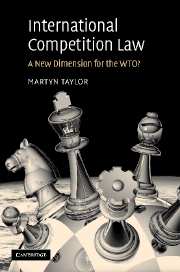Book contents
- Frontmatter
- Contents
- List of tables and figures
- List of abbreviations
- 1 Introduction
- PART I An International Competition Agreement is Desirable
- PART II The WTO Would Provide a Suitable Institutional Vehicle
- 6 Would the WTO provide a suitable institutional vehicle for an international competition agreement?
- 7 Would a WTO competition agreement promote international trade?
- 8 Would competition regulation of trade measures promote competition?
- 9 Should competition principles be introduced into anti-dumping law?
- PART III The Optimal Form for a WTO Competition Agreement
- APPENDIX: Draft negotiating text for a plurilateral WTO competition agreement
- Index
7 - Would a WTO competition agreement promote international trade?
Published online by Cambridge University Press: 17 July 2009
- Frontmatter
- Contents
- List of tables and figures
- List of abbreviations
- 1 Introduction
- PART I An International Competition Agreement is Desirable
- PART II The WTO Would Provide a Suitable Institutional Vehicle
- 6 Would the WTO provide a suitable institutional vehicle for an international competition agreement?
- 7 Would a WTO competition agreement promote international trade?
- 8 Would competition regulation of trade measures promote competition?
- 9 Should competition principles be introduced into anti-dumping law?
- PART III The Optimal Form for a WTO Competition Agreement
- APPENDIX: Draft negotiating text for a plurilateral WTO competition agreement
- Index
Summary
The relationship between trade and competition policy has been and remains an analytic quagmire.
(Portnoy, 1991)Chapter 6 of this book concluded that international trade law and international competition law could be reconciled at a theoretical level via the concept of ‘market contestability’. Chapters 7 and 8 now consider the appropriate reconciliation of both disciplines at a practical level by applying the concept of ‘market contestability’ to examples of under-regulation.
The analysis of under-regulation in Chapters 7 and 8 can be contrasted with the analysis of over-regulation in Chapter 4 of this book. Chapter 4 identified the blocking of international mergers and the extra-territorial enforcement of competition laws as examples of over-regulation. Chapters 7 and 8 now consider examples of ‘under-regulation’ involving anti-competitive conduct and problematic trade measures from the respective perspectives of international trade law and international competition law. In particular:
Chapter 7 considers anti-competitive behaviour from the perspective of international trade. Chapter 7 identifies various private anti-competitive practices impeding international trade that are not effectively regulated either by existing international trade law or domestic competition law. These examples evidence ‘under-regulation’ in the application, enforcement and substantive content of domestic competition laws.
Chapter 8 adopts the opposite perspective and considers international trade measures from the perspective of international competition. Chapter 8 identifies various trade measures that are not regulated by existing international trade law, but that adversely affect international competition. These examples evidence ‘under-regulation’ in the application, enforcement and substantive content of international trade law.
In both cases, Chapters 7 and 8 identify how an international competition agreement could be used to correct such under-regulation and thereby prevent conduct that would otherwise reduce market contestability and global welfare.
- Type
- Chapter
- Information
- International Competition LawA New Dimension for the WTO?, pp. 185 - 223Publisher: Cambridge University PressPrint publication year: 2006



